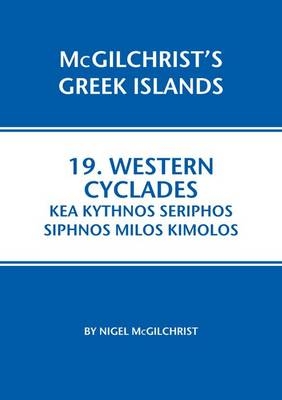
Western Cyclades: Kea Kythnos Seriphos Siphnos Milos Kimolos
Genius Loci Publications (Verlag)
978-1-907859-13-7 (ISBN)
- Titel nicht im Sortiment
- Artikel merken
Kea is unexpectedly rich in history and variety of landscape. The island is particularly good for walking; its valleys favour many species of wild flowers and its upland slopes support magnificent Valonia oaks. In historic antiquity there were four important cities on Kea and the remains of Karthaia constitute one of the most evocative sites in the Aegean. Most remarkable is the Lion of Ioulis, one of the earliest and largest pieces of monumental sculpture in the Greek world.
Kythnos has a peaceful rhythm of life which has changed little over time. There are two attractive villages Chora and Dryopida and plentiful hot water springs at Loutra in the northeast. The island's repeatedly indented coastline affords a wide variety of small coves and beaches.
Seriphos has beautiful bays for swimming and offers many opportunities for walking, with a number of ancient rural churches along the way. What stays in the memory longest however is the image of the island's dramatic chora, clustered around its peak far above the island's harbour.
Siphnos is a delight to the eye above all and furnishes more abiding images than many of its neighbours: the stately villages of elegant 17th century churches and well-maintained neoclassical mansions; the rural valleys, full of dovecotes and chapels, watched over by both ancient towers and more recent monasteries from every summit; the chapels built improbably on rocks projecting into the sea; the ancient columns and sarcophagi that adorn the alleyways of Kastro. Aghios Andreas in the centre of the island constitutes one of the most interesting archaeological sites in the Western Cyclades.
Kimolos is a delightful island: peaceful, unpretentious and full of striking landscapes. The northeast of the island is scarred by the quarrying of fuller's earth. The Kastro of Chorio dates from the 15th century.
The volcanic terrain of Milos gives rise to fascinating mineralogy: from the pure obsidian, which has been exported from Milos for at least 8000 years, to kaolin, haematite, alunite, manganese, bentonite, perlite, baryte and anderite. Milos is a busy working island with its population nearly all concentrated in the north; the south and west are wild and largely empty.
Nigel McGilchrist lectures widely in art and archaeology at museums and institutions both in Europe and in the United States. He was Director of the Anglo-Italian Institute in Rome for six years, taught at the University of Rome, for the University of Massachusetts and was for seven years Dean of the joint Faculty of European Studies for a consortium of American Universities and Colleges. In recent years he has been lecturing at the Smithsonian Institution in Washington DC and at the Santa Barbara Museum of Art in California. Over the last six years he has walked every path and village of the sixty inhabited Greek Aegean islands in order to prepare the twenty volumes of McGilchrist's Greek Islands. He lives near Orvieto in Italy where he produces olive oil and red wine.
| Reihe/Serie | McGilchrist's Greek Islands ; 19 |
|---|---|
| Zusatzinfo | 7 maps, 7 plans |
| Verlagsort | London |
| Sprache | englisch |
| Maße | 120 x 170 mm |
| Themenwelt | Reiseführer ► Europa ► Griechenland |
| ISBN-10 | 1-907859-13-6 / 1907859136 |
| ISBN-13 | 978-1-907859-13-7 / 9781907859137 |
| Zustand | Neuware |
| Informationen gemäß Produktsicherheitsverordnung (GPSR) | |
| Haben Sie eine Frage zum Produkt? |
aus dem Bereich


